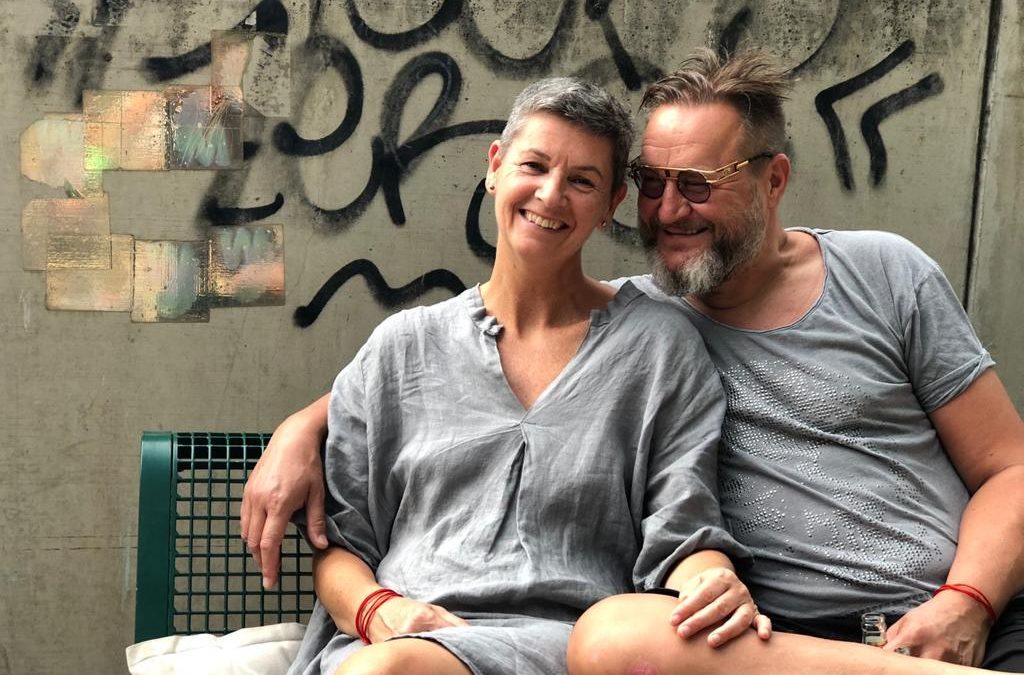There was only one thing we lacked on the road: time with friends, acquaintances and siblings. You also get to know, appreciate and value many people on the road. But the perspective seems to be different. We have noticed this time and again in various conversations over the last few weeks. - Sooner or later, the conversation inevitably turns to our tour. The topic seems to be moving. Strangely enough, three questions emerge that we hadn't expected.
We had expected people to question whether we had found happiness on the tour. Or what motivates us to continue. What about time on the road? - Does boredom set in? - How do you live in a van?
But three questions are clearly in the foreground:
„Wie könnt ihr Euch das leisten?“ – Ist es nicht schmerzhaft so viel* give up? - Woher nehmt ihr den Mut?“
*Apartment, garden, furniture, television, clothes...

We tried to answer the first of the three questions in the article „Previligiert oder „nur“ glücklich“ zu beantworten. – Darüber hinaus haben wir ja in den letzten Wochen unseren Hausstand aufgelöst. Hierbei gab es für uns nur die Frage zu klären, macht uns der Gegenstand glücklich, ja oder nein. Wenn man hierbei das „vielleicht“ weg lässt, gibt es erschreckend viel zu verkaufen oder zu verschenken. Am Ende blieben nur einige, wenige Dinge, welche wir eingelagert haben.
Womit auch die Frage beantwortet sein müsste, ob es nicht schmerzhaft ist „so viel aufzugeben“. Nein, es ist nicht schmerzhaft, denn wir geben nichts auf. Wir tauschen nur ein: Möbel gegen Geld, Wohnung, Garten, gegen Platz am Strand oder See, Fernseher gegen Sunset, Kleider gegen Freiheit. Wir gewinnen nicht nur Freiräume, sondern haben das Gefühl uns von der ein oder anderen Last zu befreien. Und apropos Verschenken, heiß es nicht „Glück ist das einzige, was sich verdoppelt in dem man es teilt“?
But the most common question is and remains the question of courage. - While the other questions were easy for us to answer, this question presents us with a challenge. Neither Torgit nor I have ever considered ourselves courageous. - So I always brushed the question aside at first. - But as the question became more and more frequent, we naturally questioned ourselves. - Is what we are doing courageous?
How is courage actually defined? - What does Google say about it?
„Fähigkeit, in einer gefährlichen, riskanten Situation seine Angst zu überwinden; Furchtlosigkeit angesichts einer Situation, in der man Angst haben könnte. – Bereitschaft, angesichts zu erwartender Nachteile etwas zu tun, was man für richtig hält.“
Wikipedia: Courage, also known as boldness or boldness, means that one dares and is capable of daring to do something, for example to enter into a dangerous situation involving uncertainty.
Synonyms are: fearlessness, courage, daring, boldness, audacity, boldness.
I found a third source, my older brother: he has a sign on his office: Normal is the absence of courage. - So if we are courageous, would that make us abnormal? - A fascinating observation.
All dies nehmen wir für uns nicht in Anspruch. Unsere Tour ist, zumindest bisher, weder gefährlich, noch riskant. Es gab nicht viele Situationen in denen man Angst haben musste. Außer vielleicht ein wenig um den Lack unseres Bullis, wenn es wieder mal darum ging eine enge Passage zu meistern. O.K. der Moment als ich den Bulli mitten in der Pampas „vergraben“ habe war nicht ganz prall. Doch man, wir wachsen ja mit den Aufgaben.
We are neither fearless nor overly reckless. Nor do we see ourselves as brash or bold. If one of the synonyms fits at all, then it is boldness. - This is the only thing we can identify with. When we do something, we do it with all our heart.
We have continued our search. What kind of quotes are there?
„Mut ist, wenn man Todesangst hat, aber sich trotzdem in den Sattel schwingt.“ – John Wayne
Sorry, we have to disappoint you, there was no fear of death. This isn't the Wild West. Although he was cool. Mr. Big Leggy.
„Ganz und gar man selbst zu sein, kann schon einigen Mut erfordern.“ – Sophia Loren
That's more like it. We are trying to live that, completely and utterly. But we are certainly only on the way there, completely and utterly, but also far away.
„Das größte Vergnügen im Leben besteht darin, das zu tun,
von dem die Leute sagen, du könntest es nicht.“ – Walter Bagehot
Das ist und war schon immer meines. „You can't“ ist eine meiner Triebfedern. – Torgit hatte schon Sorge, dass ich nur deshalb losgefahren bin, da mir etliche Menschen gesagt haben, dass ich doch nicht einfach meinen Job kündigen könnte, nach drei, vier Wochen wieder daheim wäre und… – Doch ist das alles? – Nein, ganz sicher nicht. – Es macht einfach Spaß zu reisen, es macht glücklich. Doch noch einmal zurück zum Mut.
We found two more quotes fitting. On the one hand, we see ourselves as happiness seekers...
„Mut steht am Anfang des Handelns, Glück am Ende.“ – Demokrit
...and on the other hand...
„Wo kämen wir hin, wenn alle sagten, wo kämen wir hin, und niemand ginge,
einmal zu schauen, wohin man käme, wenn man ginge.“ – Kurt Marti
A few years ago, when our friend Andrea and her partner Craig decided to give up their apartment, buy an old van for just €3,000 and simply move south, I thought it was a brave move. - Above all, I thought it was rash. - Perhaps that's exactly what courage is - doing the rash thing. Because your Tenerife report nothing at all. That's why I asked her. Here is her answer:
„Das Leben beginnt, sobald man aus seiner Komfortzone rauskommt. Zweifel sind der Verstand, das Ego. Mut ist das Herz. – Uns ist es erst später klar geworden, das es Mut war…“
Andreas Feedback bestärkt mich in einer neuen Definition – Mut ist die Abkürzung für „mal uthoughtful tun“.
Do you remember the test of courage in your youth? Was it courage or just doing something rash? Rash but cool, right?
When I saw this video of the two Russians Vadim Makhorov and Vitaliy Raskalov some time ago, I felt quite different just watching it. The two of them climb the world's tallest buildings and film themselves doing it. Here is the Shanghai Tower.
I've never been up a real skyscraper. But trees were high as a child, mountains as a teenager and as a young man I climbed a construction crane on one of the tallest buildings in Berlin. I had no fear of heights back then.
What are those Russians doing there? - Brave? - I have no idea. It seems rash, but also pretty cool. - If you think about it, the risk the two of them are taking is significantly lower than climbing on a steep slope. But the freedom they enjoy up there must be breathtaking.
War ich in anderen Situationen mutig? – War es z.B. mutig sich selbständig zu machen? Damals fragte man nur abfällig: „Warum machst du das?“ – Erst viel später kam die Frage „Wie hast du das gemacht“ -„Woher hattest du den Mut?“ – Vielleicht ist unüberlegt die Antwort auf die Frage nach dem Mut.
Torgit und ich haben vor einigen Tagen eine Dokumentation gesehen: „Anderswo. Allein in Afrika.“ Ein Dokumentarfilm über den jungen Anselm, der allein mit dem Rad durch Afrika fährt. – Das bedeutet für uns Mut. Ganz allein zu sein bedeutet Mut. Ein Leben allein zu bestreiten bedeutet Mut. Allein auf Reisen zu gehen bedeutet für uns noch mehr Mut. – Wir haben uns, was soll uns denn da noch passieren? – zusammen sind wir stark, zusammen sind wir ein Team und ja, vielleicht sind wir sogar mutig, auf jeden Fall beherzt, mit ganzem Herzen.
PS: Our respect goes to all those who travel alone! You are the truly brave ones. Or are you just rash?
PPS: Let us know how you would answer the question about courage. Which of you is brave? Step forward!


it is going to be the best experience
the best decision of my life 🙂